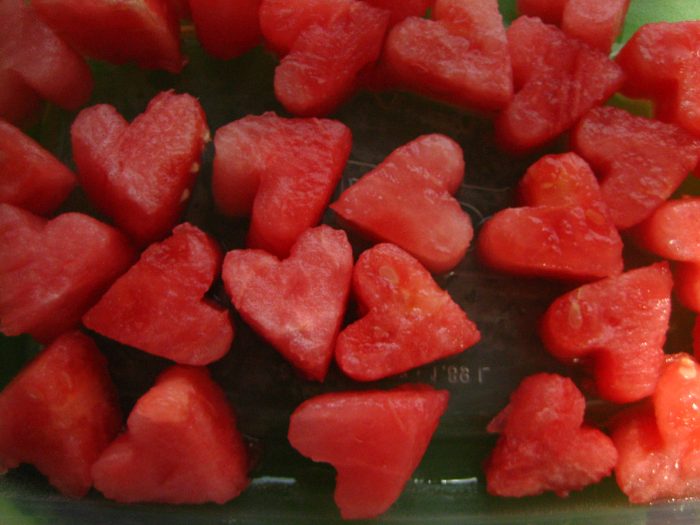Watermelon Isn’t Just For Kids

I hope everyone has memories of eating watermelon as a child. I remember the cold watermelon hitting my mouth and the sweet, sticky juice on my face. My dad told me that if I swallowed a seed I would grow a watermelon in my belly. At one point, I think I actually believed him. I also had a pair of silky pink shorts and a shirt that said, “You make my melon water.” I wanted the outfit so bad I bought it with my own money. My mother wasn’t thrilled when I wore it three days a week.
I still like watermelon, but I remember eating it more as a child than as an adult. Lately I’ve been hearing about some amazing health benefits of watermelon so I decided to dive into the research and find out for myself why I need to make watermelon a regular part of my adult diet.
There are MANY benefits to eating this delicious fruit, such as:
- Watermelon is a fat free, low calorie food. 2 cups of watermelon = 80 calories.
- Watermelon contains important electrolytes like potassium, which can help with muscle cramps, and also with feelings of anxiety.
- Watermelon contains many important vitamins and minerals our bodies need, like vitamin A (helps vision), vitamin B1 (helps give the body energy), vitamin B6 (helps with brain development, and improves mood), vitamin C (helps strengthen the immune system), biotin (good for hair, skin and nails), and magnesium (responsible for many functions in the body).
- Watermelon is 92% water, which makes it an excellent source of re-hydration after exercise, or on a hot day.
- One and a half cups of watermelon contains 9-13 grams of lycopene, which is a powerful antioxidant shown to reduce the incidence of certain types of cancer, including prostate cancer. Lycopene is also linked with reduced risk of heart attacks, and new studies link it to bone health. It also can protect the skin from harmful UV rays from the sun. Watermelon ranks up there with tomatoes, as far as providing a good source of lycopene.
- Watermelon contains citrulline, which is converted to arginine in the body. This important amino acid can contribute to healthy blood pressure and overall cardiovascular health.
One thing to consider when eating watermelon is the carbohydrate content and the fact that it is high on the glycemic index, which means it will have more of a blood sugar impact. 1 1/4 cups is equal to 15 grams of carbohydrates, which is about the same amount as a cup of berries. There is definitely a place for watermelon in everyone’s diet, but please make sure you don’t eat a large quantity at one time, as it could cause a blood sugar spike.
Sources:
National Watermelon Promotion Board – http://www.watermelon.org/
USDA AgResearch Magazine – https://agresearchmag.ars.usda.gov/2002/jun/lyco
http://patch.com/missouri/eureka-wildwood/need-some-electrolytes-skip-gatorade-and-try-this
http://www.whfoods.com/genpage.php?tname=foodspice&dbid=31
http://www.livestrong.com/article/424323-can-diabetics-eat-watermelon/


